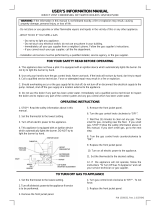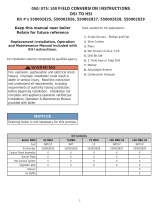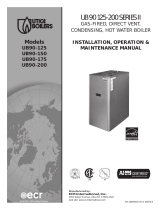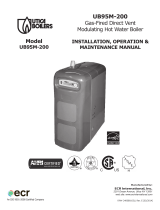
MAINTENANCE AND CLEANING
Annual service and maintenance (preferably at the beginning of each heating season) by a qualified service agency
must be performed to assure continued safe trouble-free operation and maximum efficiency. The boiler owner SHOULD
NOT attempt these procedures. This annual service should include at a minimum: examining the flue passages
between boiler sections, burner, and condensate lines, and cleaning if necessary; inspecting venting and air intake
system and cleaning if necessary; placing the boiler in operation and performing the checkout procedure; inspecting
the condensate drain pipe and cleaning if necessary; checking the silicone rubber seals between boiler sections and
repairing or replacing if necessary; and checking all gasketed and threaded joints for leakage and repairing if necessary.
Particular attention should be given to potential deterioration from corrosion or other sources. Detailed procedures
can be found in the “Maintenance and Cleaning” chapter in the installation instructions.
The boiler owner SHOULD perform the following periodic maintenance procedures.
A. Daily during heating season:
1. Check that the boiler area is free from combustible materials, gasoline and other flammable vapors and
liquids.
2. Check for and remove any obstruction to the flow of combustion air or venting of flue gases.
B. Monthly during heating season:
1. Remove front and top jacket panels and check for piping leaks around relief valve and other fittings. If
found, contact a qualified service agency to repair. DO NOT use stop leak compounds.
2. Test relief valve. Refer to relief valve manufacturer’s instructions packaged with relief valve.
3. Visually inspect venting and air intake system for proper function, deterioration, or leakage. If the vent or
air intake show any signs of deterioration or leakage, contact a qualified service agency to repair or replace
them immediately and to insure proper reassembly and resealing of the vent and air intake system.
4. Visually inspect the clear vinyl condensate lines and the PVC drain pipe for proper operation, leakage,
and deterioration. If the condensate lines or drain pipe show any signs of blockage, leakage, or deterioration,
contact a qualified service agency to clean, repair, or replace them immediately.
5. Check air vent(s) for leakage.
6. Check the air baffle located inside 1 ½” X 2” flexible coupling, clean it if necessary and make sure to put
it back. Refer to repair parts diagram, mixer and pressure switch assembly.
C. Periodically during heating season:
1. Where low water cut-offs are used, a periodic inspection of the low water cut-off is necessary, including
flushing of float type devices. Refer to the low water cut-off manufacturer’s specific instructions.
D. End of each heating season – annual shut down procedure:
1. Follow instructions in this manual “To Turn Off Gas To Appliance”.
2. If heating system is to remain out of service during freezing weather, and does not contain antifreeze,
drain system completely. If boiler will be exposed to freezing temperatures, drain condensate lines. Otherwise,
do not drain system or boiler.
BLOCKED FLUE/VENT SAFETY SHUTOFF
The Blocked Flue/Vent Safety Shutoff shuts off main burner gas in the event that the flow of combustion products
through the flue ways is reduced. In the event of blocked flue ways, enough air will not be available to support
combustion, and the Integrated Boiler Control (IBC) will lockout due to loss of proper airflow. The “PURGE” diagnostic
indicator lamp will blink indicating the failure mode as a lack of proper airflow. The IBC is reset from lockout by either
removing and reestablishing the thermostat’s call for heat , or by turning the service switch off then back on. If the
boiler cannot be restored to normal operating condition by resetting the control contact a qualified service agency to
check the flue ways for blockage.





